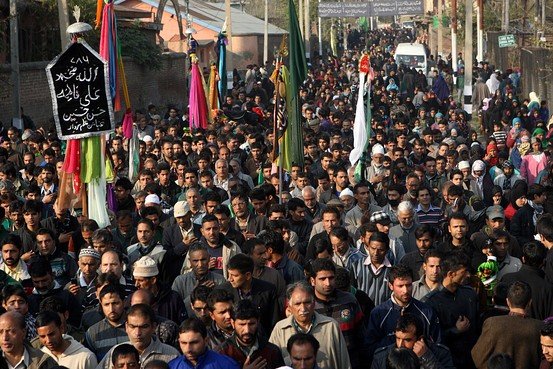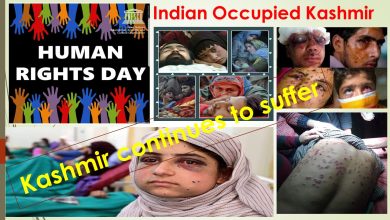Karbala to Kashmir: The unending struggle for justice and human dignity
 [Sheikh Abdul Momin]
[Sheikh Abdul Momin]
The month of Muharram heralds the beginning of the Islamic New Year, steeped in historical and religious significance. This sacred time is marked by the martyrdom of Imam Hussain (RA), the grandson of Prophet Muhammad (PBUH), who was martyred in the Battle of Karbala in modern-day Iraq. The 10th of Muharram commemorates the day when Hazrat Hussain and his 72 companions achieved martyrdom. The processions held in their honor are a solemn remembrance of their sacrifice and Imam Hussain’s moral victory.
Kashmir’s most revered resistance leader, the late Syed Ali Shah Geelani, once said, “Imam-e-Hussain (RA) didn’t belong to any particular sect or group but was an icon of bravery and justice for the whole Ummah, and the path he has shown serves as a beacon light even today for every Muslim, especially those fighting and confronting the aggression of occupation. Imam Hussain didn’t fight for power, perks, or comforts, but for justice and equality. Therefore, anybody whose religion, economy, culture, honor, life, and livelihood are always under threat by dark and dusty clouds of occupation should get inspiration from Imam Hussain (RA).”
On the anniversary of this remarkable day in Islamic history, mourners across the globe move slowly through narrow lanes and highways, feeling the profound loss that occurred over a thousand years ago in the Arabian Desert. The ancient grief still feels raw, with the mourners’ collective wailing creating a palpable sense of unity. The rhythmic chants of “Ya Hussain, Ya Hussain” comfort the grieving crowd, and the roadside stalls offering drinks to passersby convey a message of coexistence and harmony.
As a child, I never wanted my mother to finish the story of Karbala. She couldn’t hold back her tears while recounting the gruesome tyranny inflicted upon humanity. As I grew older, I read about Karbala and grasped the essence of Hazrat Hussain’s supreme sacrifice. I learned to differentiate between being a victim and a survivor. Hazrat Hussain’s martyrdom is supreme in every sense, marking him as the leader of all martyrs. He didn’t just defeat Yazeed; he defeated every tyrant and despot.
Karbala is not merely about keeping Islam alive; it is a triumph of good over evil. It symbolizes the enduring struggle against oppression and the ultimate sacrifice for justice and righteousness. Hazrat Hussain’s stand at Karbala transcends time, embodying the eternal fight for truth and moral integrity. His legacy teaches us that the battle against tyranny is an ongoing endeavor and that the spirit of resistance and the quest for justice are timeless.
Similarly, Kashmir has remained a battleground for years, plagued by political conflicts, human rights abuses, and an aspiration for self-determination. The people of Kashmir have endured suffering and sacrifice for decades to fight for their freedom and self-determination. Imam Hussain (RA) paid the ultimate price, epitomizing the individual’s eternal strive for justice and human dignity even when the situation seemed hopeless and impossible. The event of Karbala represents the voice of those who stood for their rights and did not bow to oppressive rule. In a similar way, the people of Kashmir have been fighting against oppressors to gain the right to decide their future lives. The event of Karbala serves as a grim reminder of the human strength that people can display in times of trial and bear hard times patiently, much like the situation in Kashmir.
The connection between Karbala and Kashmir is rooted in the themes of justice, resilience, and the human spirit, which are global issues. The confrontations highlight the moral duty to acknowledge universal human rights, irrespective of religious commitments or social norms, tear down imperial overreach, and fulfill the imperative of creating a just environment. They also emphasize the importance of upholding principles of equality and justice in the midst of difficulty.
As we contemplate the narratives that tell of courage, it is important that the insights of Karbala and Kashmir extend beyond the boundaries of religion and politics. They give voice to our deepest desires for freedom, justice, and the right to live with dignity. By preserving the memory of the lives lost in Karbala and supporting those who continue to struggle in Kashmir, we demonstrate our fidelity to these universal principles.
The intertwined stories of Karbala and Kashmir inspire not only through historical lessons but also in the hearts of people who aspire to live in a world of justice, distinct from the current world of injustice. Their legacies call upon us to work for a future where all individuals can live in peace, unafraid of challenges or oppression—a future that is a purposeful result of the sacrifices made in Karbala and the hopeful aspirations carried forward in Kashmir.
The writer is currently working at legal forum for Kashmir








